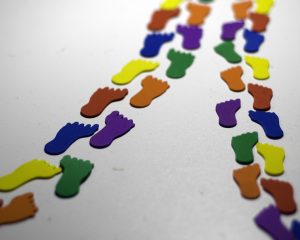 Success literature, books, articles, movies about success… are they worth following?
Success literature, books, articles, movies about success… are they worth following?
Success leaves traces… as in footprints in the sand
If you look at what people did, how they did it, the tracks converge and become the “strait and narrow’, exactly the way Leo Tolstoy says it in the Anna Karenina Principle.
So there is no wonder that I am finding articles nowadays that I could have written myself, if I were a success writer.
There are three types of success writers and success coaches.
The first type:
they can talk… and talk… and talk. No success where they are, because they don’t even try. They live by teaching something that they learned… but never successfully implemented.
The second type…
had some semblance of success… and incident, and now they are experts… The “success” is not repeatable, but it is now taught as the “Torah” of success.
The third type…
is the type who has slowly, through lots of heartache, and stumbling, stumbled on something that is now working… and it is repeatable.
There is a fourth type…
…the one who says: this SHOULD work, but it doesn’t. oops. Most PhD’s are this.
I am not a success writer, so I am often unconsciously competent. You cannot teach what you are not consciously competent about… so I rarely write anything resembling a success article. But I am happy when I find something that describes what I do…
This article (below) is a lot like that.
It says: create a system. It doesn’t spell it out, but he means to say it: build in forgiveness into the land. (it is one of the most useful principles I learned from the 67 steps!)
The forgiveness makes it less sensitive to deviations, the ravages of time, or interruptions.
The 67 steps is full of principles like that… it takes one to hear it. And it takes an ambition to take advantage of it.
The article (below) is against setting goals, and it’s against creating rigid habits.
You’ll like it.
I know where you’ll be stuck… Everyone gets stuck there. The sticky point is all around the Self… do you have it or don’t you have it.
So this article should be yet another motivator to you to start disassembling your ego-based self, and allowing your Real Self to be emerging.
Reminder: the ego based self is based on words: yours and others’.
Real self is not based on words.
OK, here is the article. Source: Mike Fishbein’s Zero Infinity
What Happened When I Stopped Setting Goals and Instead started Sticking to Habits
If you’re reading this, you’re probably an ambitious person. Maybe you have some tangible goals you want to achieve — such as making $1 million, running a marathon or writing a book.
Maybe you’ve built some habits to help you get there — such as writing 750 words everyday or going to the gym five days per week.
I used set all kinds of goals and build all kinds of habits and processes to make sure I stayed productive. I’ve tried accountability partners, tracking apps, routines, you name it.
But more recently, I’ve taken a different tact. I’ve stopped setting goals and sticking to habits.
And, despite what I’ve read in just about every book and article I’ve read on productivity and personal development, I’ve been getting great results.
I’ve been doing the best writing of my life. And the results show it. I just broke 30k views over the past 30 days on Medium. And my consulting business is growing steadily.
In this article I share how I use systems and non-tangible, ends goals to stay healthy, motivated and productive.
The Thing About Goals…
I do set goals, but not in the way most people do. Before I talk about that, I want to differentiate between means goals and ends goals.
Means goals are the tangible outcomes we want to achieve. Here are four examples of means goals:
* Get 6-pack abs
* Build 3 schools in Ethiopia
* Make $10 million
* Graduate from college
Here’s the thing about means goals. When you set a means goal:
* You are in a constant state of underachievement until you get there.
* There is a binary outcome — and if your goals are ambitious enough, there’s a good chance you will never achieve them.
In addition, it’s easy to set means goals that don’t contribute to ends goals — as well as form habits that don’t ultimately contribute to those ends goals.
Means goals are only a means to a larger, more fulfilling end goal. Ends goals are ultimate destinations. Ends goals reflect one’s personal values.
 To get to the ends goal behind a means goal, ask why you want your means goals.
To get to the ends goal behind a means goal, ask why you want your means goals.
Your answer might be:
* Freedom
* A wife or girlfriend
* Security
* Happiness
For me, my ends goals are simply to be healthy and helpful. That’s it. There’s no specific quantity or deadline. It’s pretty much the antithesis of everything I’ve read about setting goals and achieving success.
My ends goals are achieved constantly. But at the same time, they’re never really completed. They’re something to perpetually improve upon.
By not setting expectations, I’m constantly satisfied. I gain confidence and build from that.
But here’s the important thing. Ends goals are not just a desired outcome. They are an input. They are a reason to produce, but they’re also a way to become productive.
If you don’t determine your ends goals, it’s easy to be driven by means goals and habits that aren’t aligned with your values.
If you don’t know what your ends goals are, either make finding them your ends goal or create a system where you can achieve multiple ends goals (such as writing).
Systems: What I Do Instead of Goals and Habits
Some people over-stress the habits and tasks they need to complete to get what they want. “I have to go to the gym everyday.” “I have to get 20k visitors to my website this month.”
Instead, I focus on the inputs that influence the desired outcomes. A good system is not dependent on any specific task or goal. It doesn’t fail if a certain task is not completed or if a goal is not reached.
For example, one of my ends goal is to be helpful.
I can achieve that in about a million different ways. In fact, it’s only 8 am and I’ve already achieved it today. I’ve achieved it simply by working on this article that I believe will be helpful to people.
But I know there’s more that I can do to be even more helpful. For example, I can have a child and raise him or her well. That requires making some money. Or, I could start a podcast talking about important issues facing our society. That would require making even more money so that I don’t have to worry about my reputation affecting my career options.
Those two — having kids and starting a podcast — sound like fun, so I’ll work on making money.
So how do I make money? Do I set 10-year, 5-year and 90-day goals? No. I create a system.
There are a lot of ways to make money. Many of which are very uncertain. So I create a few systems that increase my chances of success. I test many different opportunities, drop the ones that don’t work and double down on the ones that do.
For example, publishing my writing online is a system.
When I started, I didn’t know exactly how much money I could make from writing or even how exactly I could make money from it. But I knew that it would create many opportunities for myself.
It could lead to meeting important people, building my brand, building an audience, consulting gigs, selling books, speaking gigs, or simply learning and building a valuable skill set that can be applied to multiple avenues. (And my writing already has lead to most of those outcomes.)
So I didn’t set a goal of selling x amount of books or making $x from writing within x years. I created a system. Because in reality, it’s the inputs to that system that influence my ability to make money from writing (not a detailed plan or process).
Furthermore, I focus on the inputs to achieving success publishing my writing, which include:
* Picking topics that people care about.
* Writing in an engaging and easy to understand style.
* Applying the best promotional strategies to maximize exposure.
* Writing and publishing regularly to increase my chances of success.
Of those, simply writing (to improve my skills and to publish more frequently) is one of the biggest inputs to making my system of publishing my writing online successful.
So how do I increase the amount that I write? Do I set a goal of writing 750 words per day? Do I make writing every morning a habit? No. I focus on the inputs.
For example, I know I do my best writing in the morning. One of the most significant inputs to writing in the morning is sleep.
Here are some of the inputs for high quality sleep:
* Wear a sleep mask to block light.
* Wear ear plugs to block sound
* Use the Sleep Cycle app so that I wake up at the right point in my sleep cycle.
Those are the levers that I pull. And they aren’t at all hard to pull.
And if I keep pulling those levers,
I know that even if I don’t write today, I’ll probably write tomorrow, because I’m improving all the factors that lead to a successful system.
Seizing Opportunities in a Complex World
We live in a complex world that’s constantly changing.
Jobs are disappearing. And entirely new industries are being created.
There’s no single variable (or habit) that can guarantee success within this kind of environment.
Nowadays, we need to be flexible. We need to diversify and manage risk. And we need to consider many different variables.
In past decades, there were only a few important variables. like where you go to college or how much money you have. Now, those are only two of probably hundreds.
Yet still, most people try to max out on one or a few variables — such as willpower, motivation or education.
With a strong system you’re not dependent on willpower, motivation or any other single variable.
For example, in order to maintain a healthy diet, I don’t keep any unhealthy food in my apartment. That way, I don’t need to use my willpower to avoid eating unhealthy food.
Here’s an example of how sacrificing a habit (a variable) actually helped me build a stronger system.
My favorite band, The Disco Biscuits, was in town the other week. They typically play for around four hours and into the wee hours of the night. So if I wanted to go to the concert, I would need to sleep in late the next day, and miss my morning writing window as a result.
But going to the concert would be fun and entertaining. It would increase my mood and energy levels for several days following the concert.
That was the dilemma. I could have stuck to a process of waking up at 6 am to write, and skipped the concert, or I could have gone to the concert.
I chose to go to the concert.
By going to the concert, one variable (waking up early) goes down, but other variables (mood and energy) go up. Ultimately it’s a break even or even a net positive.
Here’s another quick example — one that might be more relatable to ultra ambitious people reading this: Going to breakfast with a prospect that could lead to a $10k per month consulting gig. It’s worth pursuing that opportunity that came up instead of sticking to process.
When Process Fails
As I’ve kept working on personal development, I’ve always been looking for the next tactic that’s going to get me to the next level. That silver bullet. A certain diet, a certain workout, a new tracking app, etc.
But what I realized is that most tactics only solve for one variable, and don’t actually make a stronger system.
Writing every morning is a variable. Mental health is another variable.
I do my best writing in the morning, but I don’t force myself to write every morning. If I want to do client work, I do that. If I want to sleep in, I do that too.
While I may stick to my habit, if I’m trading it for my mental health, than the system hasn’t gotten stronger. Especially since being healthy is one of my ends goals. It’s zero sum.
Instead, I just focus on the many levers that I can pull to get results. I don’t worry about process. I worry about inputs. Because, as we’ve seen:
* Processes are susceptible to error (because they’re dependent on willpower).
* It’s not always in your best interest to maintain a process (because our world is always changing).
For example, if I stuck to a process of publishing on my website x times per month instead of publishing on Medium, I would have missed out on using Medium as a marketing channel that’s helping me achieve even better results.
So instead of creating process, I build a strong foundation by focusing on the inputs.
For a startup, that might mean hiring the best people so you don’t have to worry about micromanaging processes.
For a human, it might mean maximizing energy levels. (Getting stuck in process is certainly not going to increase energy levels.)
All these variables interrelate and build on each other. The system gets stronger. But no one variable can break the system.
With a strong system, I naturally take best action.
I get a high from writing. Especially when something I publish has a positive impact on people.
So I just do it.
It’s in line with my ends goals. All the other inputs are strong. I’m not dependent on discipline or willpower. I have energy and motivation. And I can’t really explain why — but it’s working.
Key Ideas
* Focusing on inputs instead of building habits or processes.
* Creating systems instead of setting means goals.
* Using achievable and non-quantified ends goals as an input.

